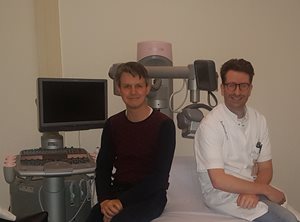20 March 2018
To determine the effect of computer-aided-detection (CAD) software for automated breast ultrasound (ABUS) on reading time (RT) and performance in screening for breast cancer.
Material and methods
Unilateral ABUS examinations of 120 women with dense breasts were randomly selected from a multi-institutional archive of cases including 30 malignant (20/30 mammography-occult), 30 benign, and 60 normal cases with histopathological verification or ≥ 2 years of negative follow-up. Eight radiologists read once with (CAD-ABUS) and once without CAD (ABUS) with > 8 weeks between reading sessions. Readers provided a BI-RADS score and a level of suspiciousness (0-100). RT, sensitivity, specificity, PPV and area under the curve (AUC) were compared.
Results
Average RT was significantly shorter using CAD-ABUS (133.4 s/case, 95% CI 129.2-137.6) compared with ABUS (158.3 s/case, 95% CI 153.0-163.3) (p < 0.001). Sensitivity was 0.84 for CAD-ABUS (95% CI 0.79-0.89) and ABUS (95% CI 0.78-0.88) (p = 0.90). Three out of eight readers showed significantly higher specificity using CAD. Pooled specificity (0.71, 95% CI 0.68-0.75 vs. 0.67, 95% CI 0.64-0.70, p = 0.08) and PPV (0.50, 95% CI 0.45-0.55 vs. 0.44, 95% CI 0.39-0.49, p = 0.07) were higher in CAD-ABUS vs. ABUS, respectively, albeit not significantly. Pooled AUC for CAD-ABUS was comparable with ABUS (0.82 vs. 0.83, p = 0.53, respectively).
Conclusion
CAD software for ABUS may decrease the time needed to screen for breast cancer without compromising the screening performance of radiologists.
Key points
• ABUS with CAD software may speed up reading time without compromising radiologists' accuracy.
• CAD software for ABUS might prevent non-detection of malignant breast lesions by radiologists.
• Radiologists reading ABUS with CAD software might improve their specificity without losing sensitivity.
Publication
Dedicated computer-aided detection software for automated 3D breast ultrasound; an efficient tool for the radiologist in supplemental screening of women with dense breasts. van Zelst JCM, Tan T, Clauser P, Domingo A, Dorrius MD, Drieling D, Golatta M, Gras F, de Jong M, Pijnappel R, Rutten MJCM, Karssemeijer N, Mann RM. Eur Radiol. 2018 Feb 7. doi: 10.1007/s00330-017-5280-3.

Ritse Mann (left) and Jan van Zelst (right) are members of the theme Women's cancers.
 Jan van Zelst and Ritse Mann showed in European Radiology that using an intelligent MinIP that comprehensively shows and enhances suspicious areas in automated 3D breast ultrasound volumes obtained in women with dense breasts increases reading efficiency without sacrificing sensitivity, thus improving the clinical utility of the technique.
Jan van Zelst and Ritse Mann showed in European Radiology that using an intelligent MinIP that comprehensively shows and enhances suspicious areas in automated 3D breast ultrasound volumes obtained in women with dense breasts increases reading efficiency without sacrificing sensitivity, thus improving the clinical utility of the technique.
To determine the effect of computer-aided-detection (CAD) software for automated breast ultrasound (ABUS) on reading time (RT) and performance in screening for breast cancer.
Material and methods
Unilateral ABUS examinations of 120 women with dense breasts were randomly selected from a multi-institutional archive of cases including 30 malignant (20/30 mammography-occult), 30 benign, and 60 normal cases with histopathological verification or ≥ 2 years of negative follow-up. Eight radiologists read once with (CAD-ABUS) and once without CAD (ABUS) with > 8 weeks between reading sessions. Readers provided a BI-RADS score and a level of suspiciousness (0-100). RT, sensitivity, specificity, PPV and area under the curve (AUC) were compared.
Results
Average RT was significantly shorter using CAD-ABUS (133.4 s/case, 95% CI 129.2-137.6) compared with ABUS (158.3 s/case, 95% CI 153.0-163.3) (p < 0.001). Sensitivity was 0.84 for CAD-ABUS (95% CI 0.79-0.89) and ABUS (95% CI 0.78-0.88) (p = 0.90). Three out of eight readers showed significantly higher specificity using CAD. Pooled specificity (0.71, 95% CI 0.68-0.75 vs. 0.67, 95% CI 0.64-0.70, p = 0.08) and PPV (0.50, 95% CI 0.45-0.55 vs. 0.44, 95% CI 0.39-0.49, p = 0.07) were higher in CAD-ABUS vs. ABUS, respectively, albeit not significantly. Pooled AUC for CAD-ABUS was comparable with ABUS (0.82 vs. 0.83, p = 0.53, respectively).
Conclusion
CAD software for ABUS may decrease the time needed to screen for breast cancer without compromising the screening performance of radiologists.
Key points
• ABUS with CAD software may speed up reading time without compromising radiologists' accuracy.
• CAD software for ABUS might prevent non-detection of malignant breast lesions by radiologists.
• Radiologists reading ABUS with CAD software might improve their specificity without losing sensitivity.
Publication
Dedicated computer-aided detection software for automated 3D breast ultrasound; an efficient tool for the radiologist in supplemental screening of women with dense breasts. van Zelst JCM, Tan T, Clauser P, Domingo A, Dorrius MD, Drieling D, Golatta M, Gras F, de Jong M, Pijnappel R, Rutten MJCM, Karssemeijer N, Mann RM. Eur Radiol. 2018 Feb 7. doi: 10.1007/s00330-017-5280-3.
Ritse Mann (left) and Jan van Zelst (right) are members of the theme Women's cancers.
Related news items

Supplemental MRI screening for women with extremely dense breast tissue
9 January 2020 In the New England Journal of Medicine, the DENSE trial study group including RIHS researchers Ritse Mann and Nico Karssemeijer showed that additional MRI after the nationwide breast screening, reduces interval breast cancer in women with extremely dense breast tissue. go to page
Awarded KWF grants for Radboudumc researchers
18 December 2019 KWF is investing 2.7 million euros in five different studies at Radboudumc. The awards are part of the new round of funding by DCS, in which over 34 million euros will be granted to Dutch cancer research. We congratulate our researchers with this funding and wish them success with their great work. go to page
ERC Consolidator Grant for Bousema and Sechopoulos
12 December 2019 Teun Bousema and Ioannis Sechopoulos each receive an ERC Consolidator Grant of around two million euros. This European research subsidy will enable them to carry out research for the next five years. go to page
Technology for Oncology II grant application funded
21 November 2019 The grant application called "aiREAD – Accurate and Intelligent Reading for EArlier breast cancer Detection” by project leader Ioannis Sechopoulos, has been selected for funding under the NWO TTW – KWF Kankerbestrijding – Top Sector LSH Partnership “Technology for Oncology II”. go to page
VIDI grant for Ritse Mann
27 May 2019 Ritse Mann, theme Women's cancers, receives up to 800,000 euros to develop an innovative research theme and to build up his own research group. NWO is awarding the Vidi grant as part of the Innovational Research Incentives Scheme. go to page
